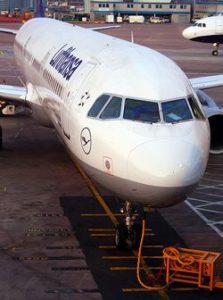30 November 2010, Deutsche Welle
Author: Richard Connor (AFP, AP, dpa), Editor: Nancy Isenson
German airline Lufthansa plans to begin testing the use of biofuels on one of its popular domestic flight routes from April next year. The carrier hopes to make inroads into cutting the size of its carbon footprint.
Germany’s national air carrier Lufthansa said on Monday it would start to test the use of biofuel to supplement kerosene on one of its major domestic flights.
The airline plans to use the dual fuel sources on its four-times-daily service between Hamburg and Frankfurt from April 2011, in a project aimed at reducing carbon dioxide emissions.
“Through the test on the route between Hamburg and Frankfurt, the effect of the biofuel on the maintenance and lifespan of the engines can be investigated,” said Manfred Aigner, head of the German Aerospace Center’s combustion technology institute.
A quarter of the fuel used by the Airbus 321 airplanes operating on the route will be composed of a synthetic mixture made from 50 percent vegetable oil.
Up to four times more costly than kerosene
Lufthansa plans to spend 6.6 million euros (8.7 million dollars) on the project, with the biofuel costing three to four times more than kerosene.
Project leader Joachim Buse told a press conference that the use of biofuel would mean a reduction in carbon dioxide emissions of 1,500 metric tons over the six-month test period.
While air Japan and Air New Zealand have already tested biofuels in their airplanes, Lufthansa said it would be the first carrier to use them on a regular basis.
The airline said it hoped that biofuels could make up between five and ten percent of its fuel consumption by 2020.

